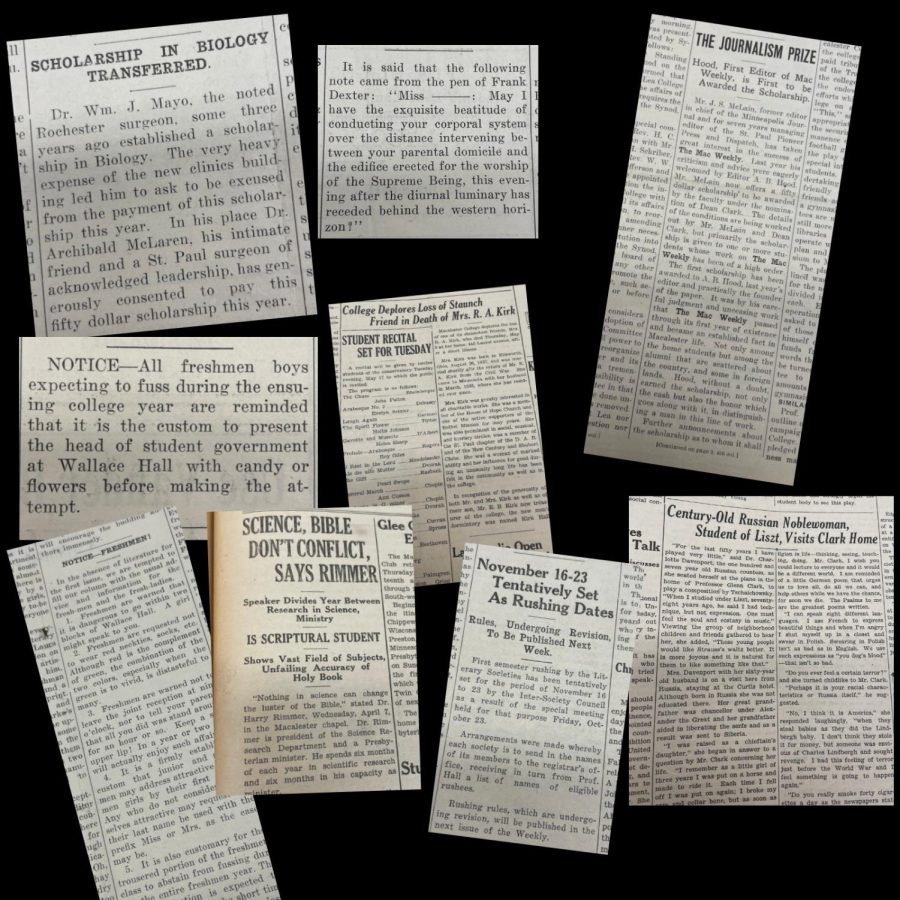Way back at Mac: the early Mac Weekly
November 10, 2022
A lot has changed at Macalester in recent years, with the shift in Macalester’s presidency, the adjustment to the COVID-19 pandemic, and the regular changes in student population.
However, many inhabitants of Macalester’s modern day campus know very little about the history of the school. Sure, there are traditions that have persisted throughout the years, like playing pushball in the winter, or the lore of the sex bell. Still, since the college’s founding in 1874, a lot has changed.
For example, despite currently being known for its lack of Greek life, Macalester once had literary societies, which functioned in much the same way that sororities and fraternities do, but in a more “liberal arts” way.
“First semester rushing by the Literary Societies has been tentatively set for the period of November 16 to 23 by the Inter-Society Council,” one excerpt from an old Mac Weekly paper reads.
The names that now mark the buildings students walk through and dwell and also appear in these old papers, such as one Miss Margaret M. Doty. Formerly Macalester’s Dean of Women, which might seem an outdated role and term now, Miss Doty was at the forefront of female entry into the university sphere.
An excerpt from the Mac Weekly reads “Miss Margaret M. Doty attended the annual conference of Deans of Women … About 350 women were present.”
Other representatives from Minnesota were from schools that some might find familiar, such as the chairman of the college section of St. Olaf’s College and a Sister from St. Catherine’s College.
Another familiar name, an obituary for Mrs. R. A. Kirk, explains how Kirk Hall was named. The article briefly goes over the highlights of her life and charitable works, and refers to her as one of the “staunchest friends” of Macalester College.
“In recognition of the generosity of both Mr. and Mrs. Kirk as well as their son, Mr. E. B. Kirk now treasurer of the college, the new men’s dormitory was named Kirk Hall,” the article explains.
Another short article regarding Mrs. Kirk’s death talks about how she was one of the first female voters, and lived in Minnesota while the state was still developing, through events such as the choosing of the state flag and flower. According to the piece, Mrs. Kirk died at the age of 95.
The early papers are also much more religious, a reminder that Macalester’s Presbyterian affiliation was much once stronger than it is now. The paper regularly ran a “Presbyterian Priests Column,” which included information about churches in the area and actions of their reverends.
In another edition of the paper, a presbyterian minister known as Dr. Rimmer is reported to have given a speech in the Macalester chapel regarding the conflict between science and the bible.
“Nothing in science can change the luster of the Bible,” Rimmer said.
“Science, Bible don’t conflict, says Rimmer,” the headline of the article reads.
Still, historical issues of the Mac Weekly have had a humorous aspect to them. An advice section of the paper reads, “Freshmen are warned that it is dangerous to go within two blocks of Wallace Hall. A girl might speak to you.”
“NOTICE—All freshman boys expecting to fuss during the ensuing college year are reminded that it is the custom to present the head of student government at Wallace Hall with candy or flowers before making the attempt,” another excerpt reads.
In keeping with the theme of creating jokes out of male and female student interactions, a hypothetical love letter written by a student is supposed to have said “May I have the exquisite beatitude of conducting your corporeal system over the distance intervening between your parental domicile and the edifice erected for the worship of the Supreme Being, this evening after the diurnal luminary has receded behind the western horizon?”
All in all, the historical Mac Weekly differs greatly from the Mac Weeklys you see around campus today. With more humor based content and significantly more ads, it was one of the main modes of communication and ways of getting knowledge to students, faculty and staff, and was read by nearly every student.
*Andie Walker contributed to the reporting for this story.














